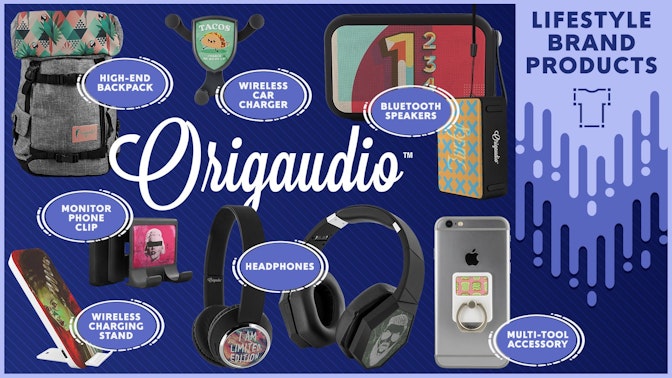With coronavirus having an impact on every country in the world, businesses are working quickly to adapt their practices to our new “normal.”
For the last few weeks, we’ve endeavored to write articles filled with advice and pointers on how to bring your business through a pandemic. So far, this has included things such as communicating with suppliers and customers and making improvements that will help your business in the long-term. Today we’re going to jump into some more immediate changes you can make to your store, helping you adapt during the pandemic.
However, these tips aren’t only applicable during a pandemic. They’re also examples of how you can quickly use new trends or events to keep your store and products relevant. We hope that they’ll not only help your business survive this event but thrive in the future. Let’s get started.



Adjust Your Ad Copy
Over the last month, ecommerce traffic has gone through the roof. With many traditional brick and mortar stores closed, people are taking to the internet to browse and spend their cash. Between March 13-15, ecommerce grew 25 percent compared to March 1-11. And in April Shopify has reached a level of traffic not generally seen until Black Friday.
→ Click Here to Launch Your Online Business with Shopify
While online grocery sales are a significant contributor to the increase, people are also buying other items to make life easier during self-isolation. And this is something that you should consider when you’re writing ad copy.
Rather than selling products as you were before the pandemic, entice customers by pointing out how this product will be useful during lockdown. For example, if you sell exercise equipment like resistance bands, you should add copy that explicitly points out that they can be used for indoor workouts. Or, if you sell craft supplies, be sure to mention that it’s the perfect time to learn a new skill or start a new project.
Nike was swift to change its advertising strategy. They highlighted the need for teamwork, and adapted their tagline to “play inside, play for the world.” However, they didn’t ease off advertising their products. Instead, they pivoted to focus on promoting indoor workouts using their app.
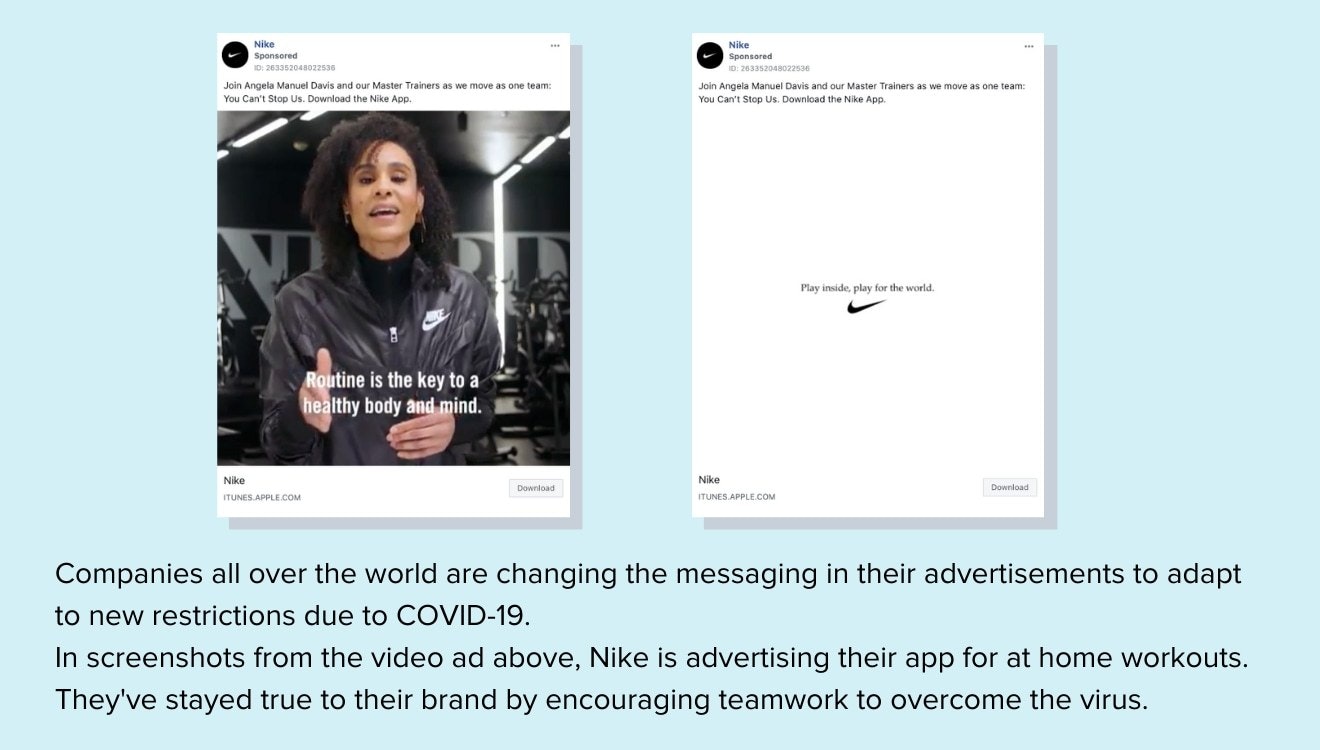
As with any ads, you want to make the product as alluring as possible. We hook visitors by telling them why they need a product. So, given that circumstances have changed so much, we need to make sure our marketing is still hitting the mark.
Stop Ads on Low Demand Products, Let New Trends Inform Product Choice
Although there are plenty of opportunities to alter ad copy and make it relevant, for some products, now just isn’t the right time to be selling. Rather than continuing to advertise products that currently have low demand, hit pause on these campaigns.
If you find a product isn’t selling or is selling at far lower quantities than before, now’s the time to start testing alternative products that could be your next big seller. It’s easy to feel unmotivated when demand for a product dries up but instead, look at it as an opportunity. And, remember, no one said entrepreneurship would be easy.
With so many people changing their lifestyles at the moment, there are a lot of eager shoppers looking to buy products they suddenly have a need or want for. This includes items such as home office equipment, home gym gear, or products for entertainment. Think about things you, your family, or your friends recently bought, then think about related items that could also sell well.
When you have a few potential products, check social media and Google Trends to get a feel for which might work well at this time. Act quickly to capitalize on the interest in these items. With the coronavirus situation changing so rapidly, what works now may not work in two or three weeks.
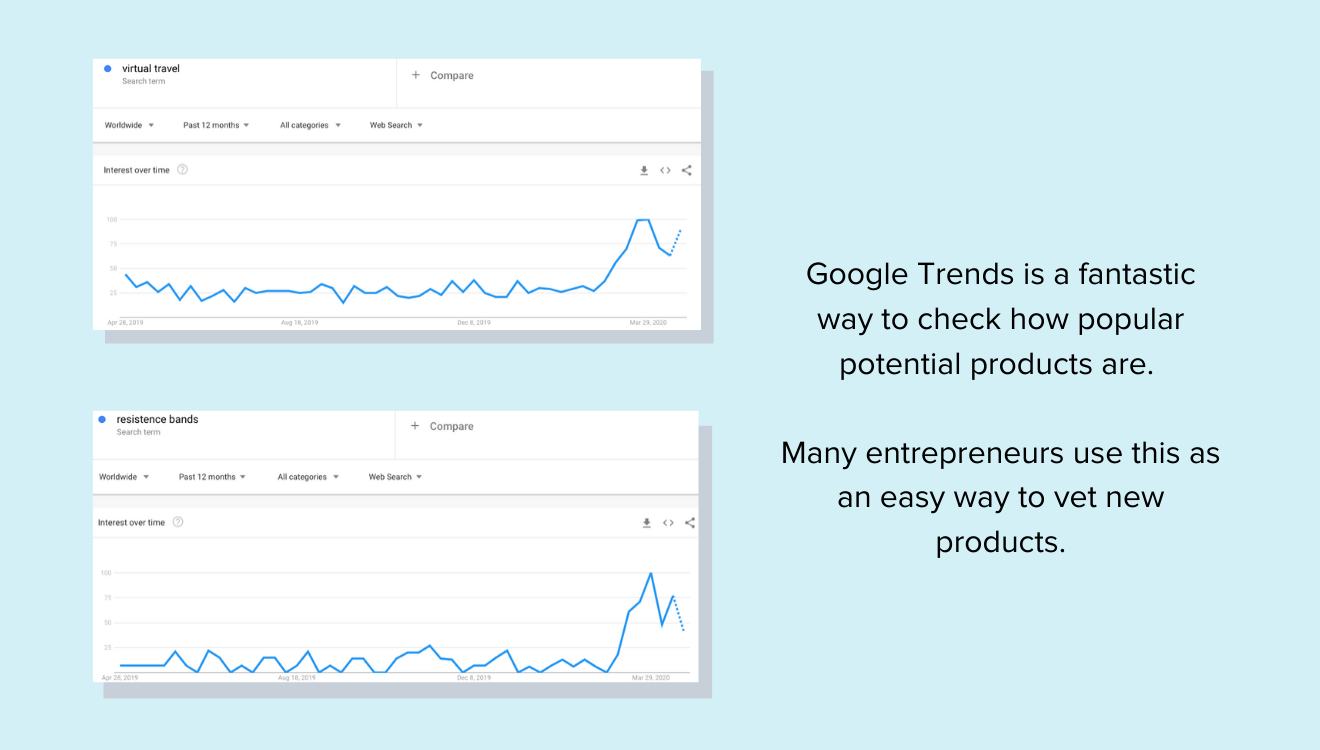
If you’re unsure about how to go about finding potential winning products, you might benefit from a system developed by dropshippers Shishir and Namrata. Through trial and error, Shishir has developed a four-stage process that he puts his products through before he decides to scale them. The stages go from product choice to finding an audience, then onto ad effectiveness and website conversion.
Altering Product Page Copy
If you’ve been adapting your ad copy, you should adjust your on-page product copy as well. Your product page is where you can make your final push to sell your product, so you want to make sure it entices, informs, and educates your audience.
The first thing you can do on your product pages is to add a quick note about your business status. Add a line at the very top of your page that quickly informs visitors whether or not you’re still operating, if there are postage delays or anything else that’s relevant. Many dropshippers worry that informing customers about long shipping times may deter buyers. However, many full-time dropshippers include this and have no issues. It can benefit your store as it sets customer expectations and helps avoid customer complaints.
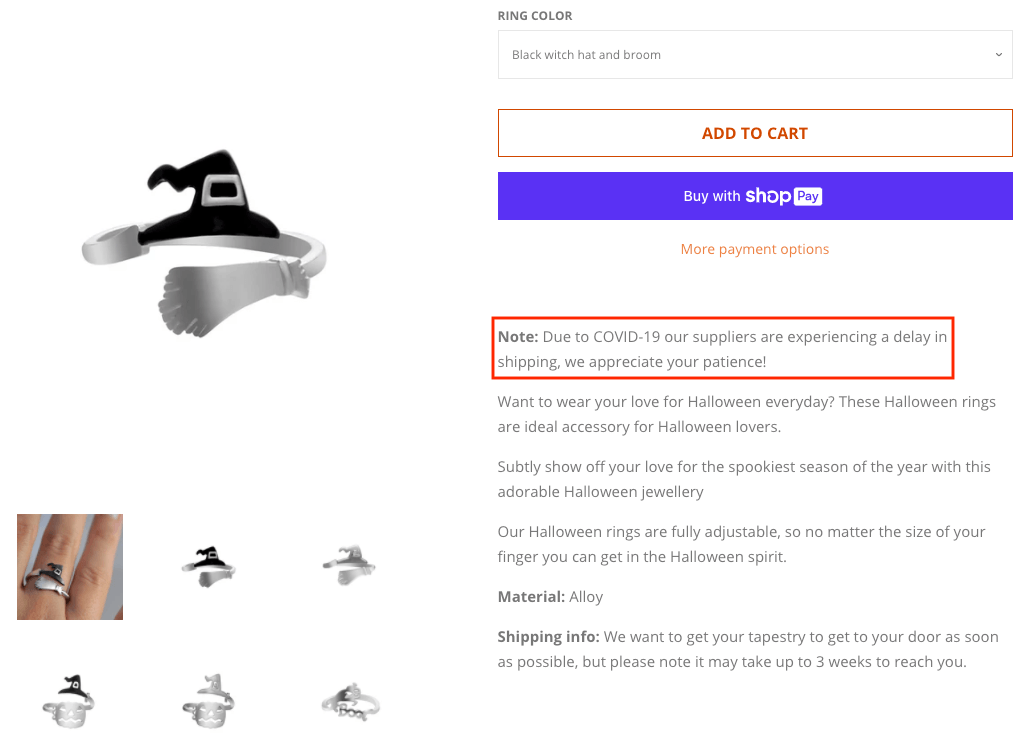
Next up, think about whether you could add any new sections to your product page. Perhaps it makes sense to have a few lines about how your product can be used indoors. Or write about how beneficial it would be to own this product right now. You could also go an extra step and write a specific blog post outlining why this product is so great to have right now.
It’s important to note that you can’t make any fake promises or try to use pseudo-science to imply your products will protect or heal buyers from coronavirus. However, that doesn’t mean you can’t mention the virus. For example, you could point out how a paint-by-numbers set will alleviate lockdown boredom, or that home gym equipment will keep you fit while gyms are closed.
Whatever you write, you want to make your product seem as relevant as possible, so make sure you convey that message on your product page.
Changing Banners and Home Page
Going hand in hand with changing product pages is adjusting other pages and alerts on your site.
If your website has an announcement bar or banner, this is an easy way to get a quick message out to those browsing.
You could use the bar to state that there will be shipping delays, or on the flip side, to let customers know that your store is open and operating. Store owner Courtney White is using the announcement bar on her children’s clothing store Finer and Dandy, to reassure and inform customers. Her announcement bar lets visitors know that the store is still open, and she’s even linked it to a special COVID-19 information page.
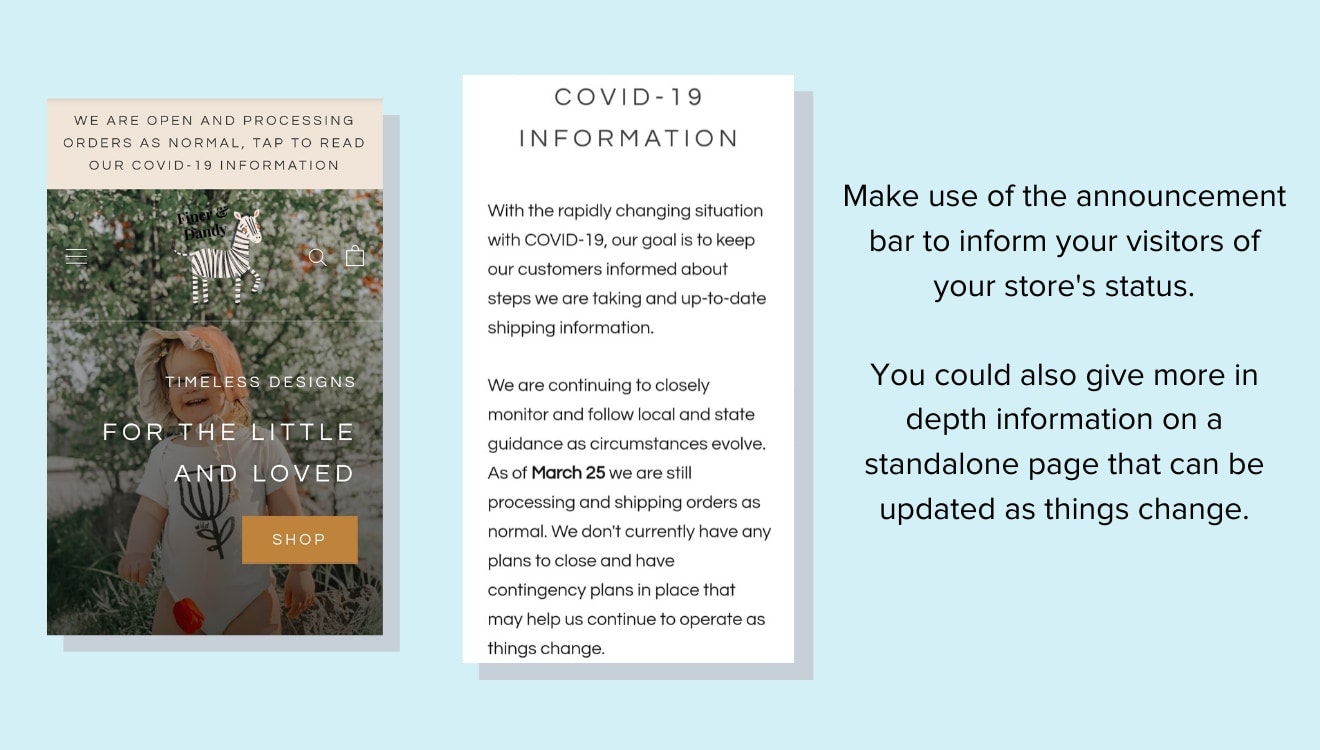
Alternatively, try using the announcement bar to thank your customers. A simple message conveying your appreciation for their patronage during this time is an excellent way to build relationships. It will make visitors to your store feel appreciated and valued. This could even be bundled with a special discount, encouraging visitors to purchase.
In addition to using the announcement bar, you could also use hero images, or image slideshows to relay a message about your store’s status during COVID-19. This is a good idea if you want to show a message but keep it looking consistent with the rest of your store.
Many of these changes are small and can be done in minutes. However, they keep your online store and products relevant and trustworthy. Ultimately, building trust is how you get customers to spend money on your store, so taking a few minutes out of your day to switch ad copy, add notes about shipping times, or promote more suitable products will pay dividends over time.
How have you adjusted your ads or on-site copy during the COVID-19 pandemic? Share your strategy and results with other entrepreneurs below.






